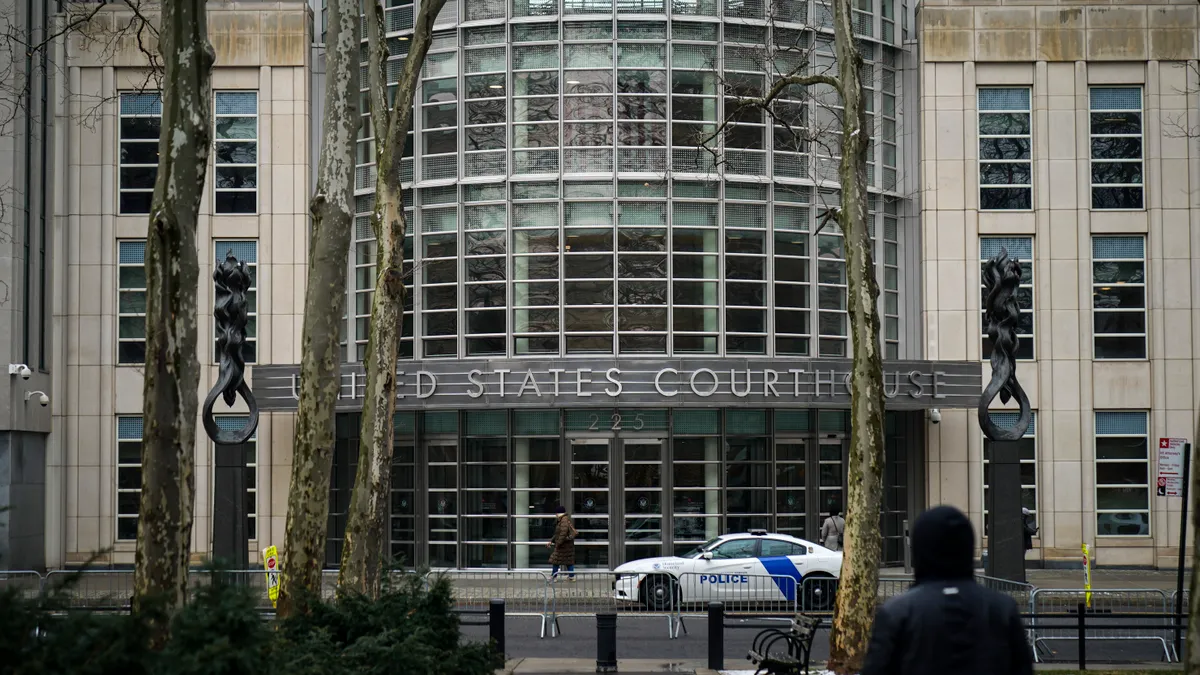Dive Brief:
- The New York State Unified Court System (NYSUCS) did not violate Title VII of the Civil Rights Act of 1964 when it denied a senior office clerk’s request for one month’s leave to attend a religious spiritual retreat in India and then fired her, a federal district court held Oct. 16 (Gandhi v. New York State Unified Court System).
- Every year, for several years, the NYSUCS granted the clerk’s request to take three weeks of annual leave in February to attend the retreat, according to the court record. The last year she made the request, she asked for a month’s leave, but the NYSUCS granted her only one week. It said this was due to operational needs. She worked at the Albany court, and the office there was short-staffed that month, it said.
- The clerk was terminated two months later. The NYSUCS asserted that it did so after confirming from her doctor that her degenerative spine condition required her to be permanently restricted from filing, which it considered an essential part of her job.
Dive Insight:
Following her termination, the clerk brought various state and federal law claims against the NYSUCS, including disability discrimination under the Americans with Disabilities Act and religious discrimination in violation of Title VII.
All the claims, except for religious discrimination under Title VII, were dismissed prior to this ruling. In this decision, the court granted summary judgment to the NYSUCS on the Title VII claim.
HR professionals may want to take note of the case because of its employer-favorable ruling following the U.S. Supreme Court’s June 2023 decision making it more difficult for employers to prove “undue hardship” in Title VII religious accommodation cases.
In the SCOTUS ruling, Groff v. DeJoy, the justices unanimously held that to prove a religious accommodation request posed an undue hardship and could therefore be rejected under Title VII, an employer must show the accommodation would place a substantial burden “in the overall context of [its] business.”
Although this case wasn’t presented as a religious accommodation suit, employers faced with such claims may take a cue from the court’s reasoning: It said the record established that the NYSUCS provided a legitimate reason for denying the clerk’s request for a month’s leave that February: doing so would have strained office operations due to staff shortages.
In turn, the clerk failed to show NYSUCS’s decision to deny her full request for leave was motivated by religious discrimination. In particular, she failed to show she was treated less favorably than other co-workers.
That is, she had worked for the NYSUSC for close to two decades, and during this time, the Albany office had several dozen employees, the court noted. Yet, the clerk could identify only two co-workers who had ever requested three consecutive weeks of leave, and no co-workers actually took it, the court pointed out.
The NYSUCS also provided a legitimate reason for terminating the clerk, and she failed to show that decision was motivated by religious discrimination, the court held.
For about a year after she informed the NYSUCS that her degenerative arthritis prevented her from filing, co-workers did the filing for her, according to the record. When her doctor ultimately confirmed that her filing restrictions were permanent, and she conceded that she would continue to need significant help from her co-workers, the NYSUCS determined she was incapacitated per her union’s contract and terminated her.
The worker argued that a comment that the chief clerk in the office — who was not her supervisor — allegedly made to her was evidence the reasons NYSUCS gave for denying her full request for leave and then terminating her were a pretext for religious discrimination.
She claimed that after she returned from the retreat the year before she was fired, he told her that he didn’t “care for your religion or spirituality; you are never going to get this kind of time off again.”
The court rejected the argument, holding the comment was merely a stray remark and didn’t suggest either decision was motivated by discrimination. The chief clerk did not make or recommend either decision, and there was no evidence he tried to influence them, it explained.









